


Walking New Orleans: 30 Tours Exploring Historic Neighborhoods, Waterfront Districts, Culinary and Music Corridors, and Recreational Wonderlands
Copyright 2015 by Barri Bronston
Project editor: Ritchey Halphen
Cover and interior photos: Copyright by Barri Bronston, except where noted
Cartographer: Scott McGrew
Original cover and interior design: Larry B. Van Dyke and Lisa Pletka; typesetting and layout: Annie Long
Proofreader: Rebecca Benton Henderson
Cataloging-in-Publication Data is available from the Library of Congress.
ISBN: 978-0-89997-761-4; eISBN: 978-0-89997-762-1
Manufactured in the United States of America
| Published by: |  WILDERNESS PRESS WILDERNESS PRESS |
| An imprint of Keen Communications, LLC |
| PO Box 43673 |
| Birmingham, AL 35243 |
| 800-443-7227; fax 205-326-1012 |
Visit wildernesspress.com for a complete listing of our books, and for ordering information. E-mail us at info@wildernesspress.com with questions or concerns.
Distributed by Publishers Group West
Cover photos: Front, clockwise from bottom left: Piety Street Arch, Crescent Park, Bywater; view of the Central Business District from the AlgiersCanal Street ferry landing, Algiers Point; Holocaust Memorial, Woldenberg Riverfront Park; Cresson House, Faubourg St. John; statues in Louis Armstrong Park, Treme. Back, top to bottom: Pat OBriens, French Quarter; Latter Memorial Library, St. Charles Avenue; Gumbel Memorial Fountain, Audubon Park.
Frontispiece: Galatoires restaurant, Bourbon Street (see , French Quarter)
All rights reserved. No part of this book may be reproduced in any form, or by any means electronic, mechanical, recording, or otherwise, without written permission from the publisher, except for brief quotations used in reviews.
SAFETY NOTICE Although Wilderness Press and the author have made every attempt to ensure that the information in this book is accurate at press time, they are not responsible for any loss, damage, injury, or inconvenience that may occur to anyone while using this book. You are responsible for your own safety and health while following the walking trips described here. Always check local conditions, know your own limitations, and consult a map.
ACKNOWLEDGMENTS
WRITING THIS BOOK WAS A CHALLENGING ENDEAVOR that I could not have fulfilled without the help of many individuals and organizations.
First of all, I would like to thank Wilderness Press for recognizing the importance of New Orleans as a walking city and former Acquisitions Editor Susan Haynes for giving me this amazing opportunity. I would also like to thank current Acquisitions Editor Tim Jackson for keeping me on track with deadlines and assisting with big-picture issues; Ritchey Halphen, a New Orleans native, for his amazing and meticulous editing; and the production team of cartographer Scott McGrew, typesetter Annie Long, proofreader Rebecca Henderson, and indexer Sylvia Coates for putting all the pieces together and adding the finishing touches.
In addition, I want to thank my sister Donna Goldenberg for her wonderful photography, along with her husband, Eric, and son, Trevor, who accompanied Donna and me on a walk through the breathtaking Jean Lafitte Barataria Preserve. And thanks to Janet Pesses for joining me on one of the longest walks in the bookthat being the equally spectacular Lakefront area.
In addition, thanks go out to Kathryn Hobgood Ray for her help with the Algiers Point neighborhood, to Beth Donze for her expertise on Faubourg St. John, and to Lisanne Brown for steering me to Crescent Park and other funky spots in Bywater. A big thank-you to Eddie Bronston, my former husband but still good friend, for lending his musical expertise for the walk covering Faubourg Marigny and Frenchmen Street. Id also like to acknowledge Mike Strecker, my boss at Tulane University, for reviewing the University section and making sure that I included some of Tulanes most important landmarks.
For two of the walksthe Lower Ninth Wards Make It Right neighborhood and Jean Lafitte Barataria PreserveI relied on their materials and maps, and for those I would like to thank both of them. I also want to thank the New Orleans Tourism Marketing Corporation and the St. Tammany Parish Tourist & Convention Commission for providing me with some terrific images.
Although she no longer lives in New Orleansbut knows it almost as well as I domy daughter and best friend, Sally Bronston, served as a great sounding board as I pondered various aspects of the book, especially what bars and restaurants to include. Thanks, kid! You may live in New York City, but NOLA will always be home.
Barri Bronston

A stroll through the Lower Garden District ( ) will take you past some of the funkiest shops on Magazine Street, including Miette, which sells locally made jewelry, clothing, and home accessories.
AUTHORS NOTE
I WAS BORN IN NEW ORLEANS IN THE LATE 1950S, and except for four years attending college in Missouri and another year living in Arkansas, Ive spent pretty much my entire life in what is often referred to as one of the worlds most fascinating cities.
For most of that time, I was a journalist, an experience that gave me an up-close encounter with the people and places that have made New Orleans one of the coolest, craziest, and most captivating destinations on the map.
Still, as a native, I tended to take my city for granted. Not until I took on this book in the summer of 2013 did I really start to get itthat it being the heap of honors that have been bestowed on New Orleans in recent years, among them being named one of the worlds top 10 cities by Travel & Leisure, a best American city for foodies by Cond Nast Traveler, and one of six trips that will change your life by Coastal Living. And in 2014, New Orleans came in seventh on the online magazine Good s list of the 50 Most Inspiring Cities in the Worldhigher than any other city in the United Statesbased on its street vibrancy, green life, civic engagement, and entrepreneurship, among other factors.
The city has certainly overcome more than its fair share of challenges, but Im more proud than ever to be a native and resident of New Orleans.

NUMBERS ON THIS LOCATOR MAP CORRESPOND TO WALK NUMBERS.
TABLE OF CONTENTS
INTRODUCTION
THE MANY RECENT ACCOLADES that New Orleans has received show just how far the city has come since August 29, 2005, when Hurricane Katrina became one of the most horrific disasters our country has ever known. That powerful, life-altering storm destroyed approximately 80 percent of New Orleans, killed more than 1,800 people, and forced hundreds of thousands to flee the city, some forever. Even worse, it had some politicians arguing against spending federal dollars to rebuild a city that lies 7 feet below sea level.
It looks like a lot of that place could be bulldozed, thenSpeaker of the House Dennis Hastert famously said just a few days after the storm.
Next page

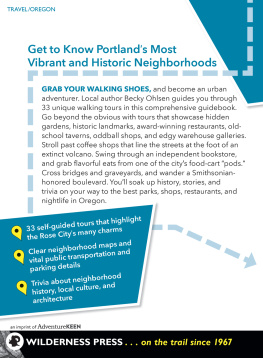
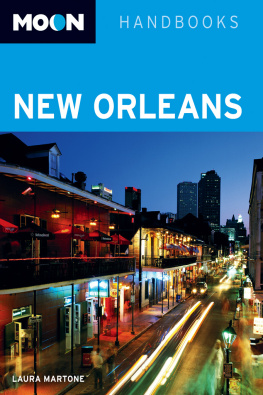

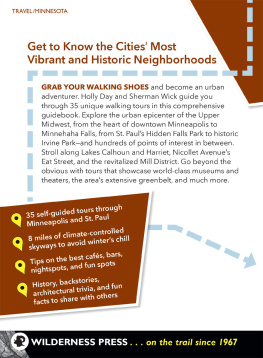
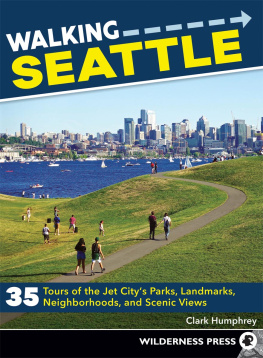
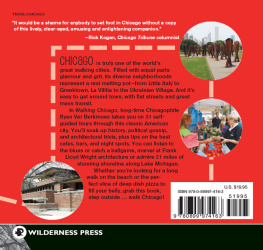
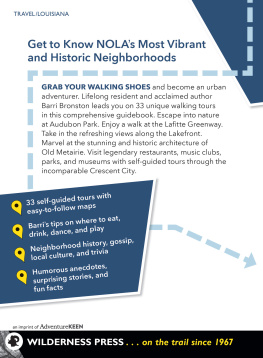
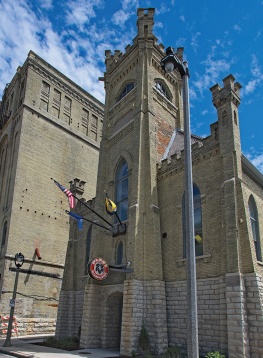
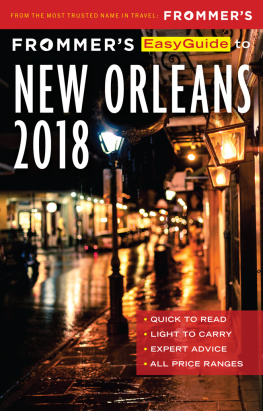




 WILDERNESS PRESS
WILDERNESS PRESS
